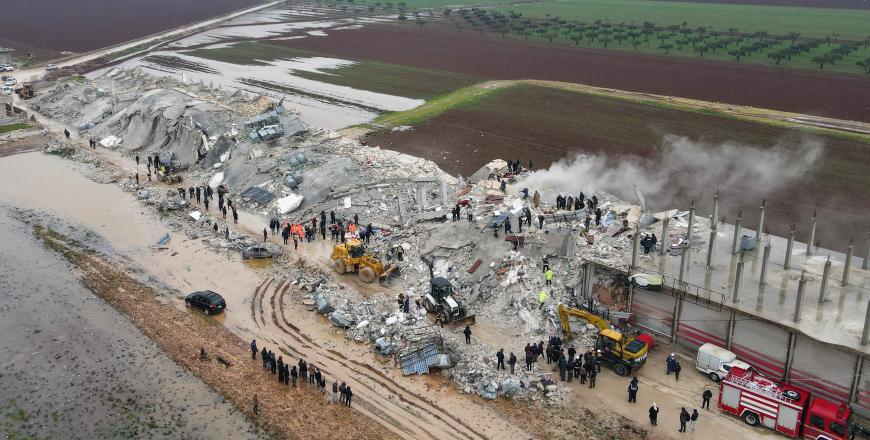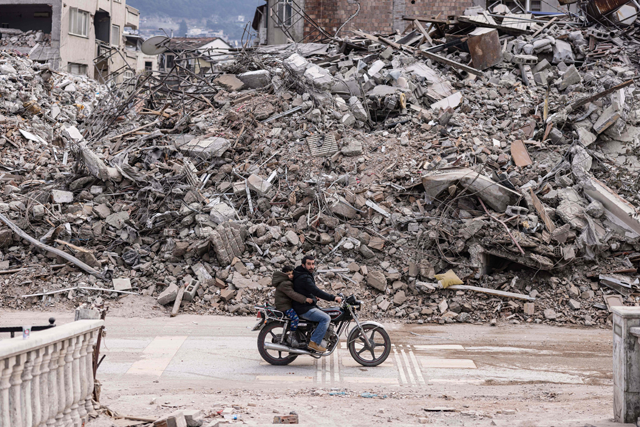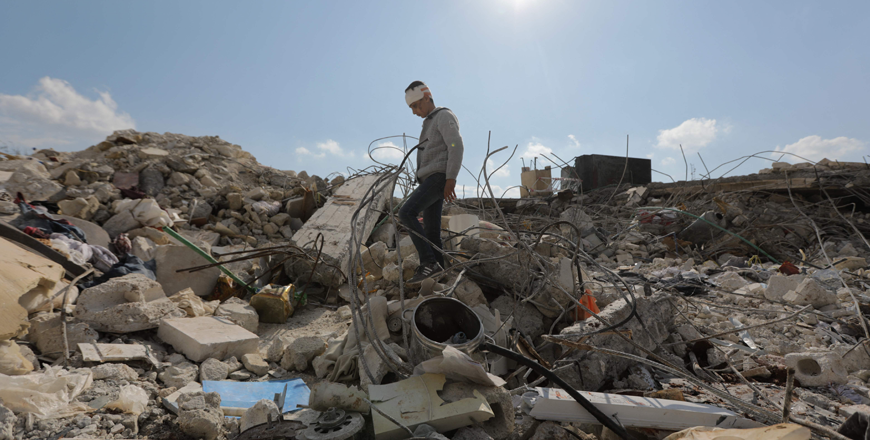You are here
Rescuers battle cold as Turkey-Syria earthquake death toll hits 5,000
By AFP - Feb 07,2023 - Last updated at Feb 07,2023

Mesut Hancer holds the hand of his 15-year-old daughter Irmak, who died in the earthquake in Kahramanmaras, close to the quake's epicentre, the day after a 7.8-magnitude earthquake struck the country's southeast, on Tuesday (AFP photo)
SANLIURFA, Turkey — A massive rescue effort in Turkey and Syria battled frigid weather in a race against time on Tuesday to find survivors under buildings flattened by an earthquake that killed more than 5,000 people.
Tremors that inflicted more suffering on a border area already plagued by conflict left people on the streets burning debris to try to stay warm.
Rescuers were working on collapsed apartments with heavy equipment as a worldwide relief effort promised food, search teams and equipment for the disaster zone.
"We live on the first floor out of three, we're too scared to return," said Imam Caglar, 42, in the Turkish city of Sanliurfa. "Our building is not safe at all."
"My mother-in-law, my father-in-law, and two of my father-in-law's sons [are trappe]," said Mahmoud Al Ali in the Syrian city of Aleppo. "We are sitting here in the cold and rain and waiting for the rescuers to start digging."
The 7.8-magnitude quake struck on Monday as people slept, flattening thousands of structures, trapping an unknown number of people and potentially impacting millions.
Whole rows of buildings collapsed, leaving some of the heaviest devastation near the quake's epicentre between the Turkish cities of Gaziantep and Kahramanmaras.
The destruction led to Turkish President Recep Tayyip Erdogan declaring Tuesday a three-month state of emergency in 10 south-eastern provinces.
Fears toll will rise
A winter storm has compounded the misery by rendering many roads — some of them damaged by the quake — almost impassable, resulting in traffic jams that stretch for kilometres in some regions.
The cold rain and snow are a risk both for people forced from their homes — who took refuge in mosques, schools or even bus shelters — and the survivors buried under debris.
"It is now a race against time," said World Health Organisation (WHO) chief Tedros Adhanom Ghebreyesus.
"We have activated the WHO network of emergency medical teams to provide essential health care for the injured and most vulnerable," he added.
Turkey put the latest death toll at 3,419 in that country alone — bringing the confirmed tally in both Turkey and Syria to 5,021.
There are fears that the toll will rise inexorably, with WHO officials estimating up to 20,000 may have died.
WHO warned that up to 23 million people could be affected by the massive earthquake and urged nations to rush help to the disaster zone.
The Syrian Red Crescent appealed to Western countries to lift sanctions and provide aid as President Bashar Assad’s government remains a pariah in the West, complicating international relief efforts.
Washington and the European Commission said on Monday that humanitarian programmes supported by them were responding to the destruction in Syria.
‘My family under rubble’
The UN’s cultural agency UNESCO also said it was ready to provide assistance after two sites listed on its World Heritage list in Syria and Turkey sustained damage.
In addition to the damage to Aleppo’s old city and the fortress in the south-eastern Turkish city of Diyarbakir, UNESCO said at least three other World Heritage sites could be affected.
Much of the quake-hit area of northern Syria has already been decimated by years of war and aerial bombardment by Syrian and Russia forces that destroyed homes, hospitals and clinics.
Residents in the quake-devastated town of Jandairis in northern Syria used their bare hands and pickaxes to for survivors, as that was all they had to get the job done.
“My whole family is under there — my sons, my daughter, my son-in-law... There’s no one else to get them out,” said Ali Battal, his face streaked with blood and head swathed in a wool shawl against the bitter cold.
“I hear their voices. I know they’re alive but there’s no one to rescue them,” adds the man in his 60s.
The Syrian health ministry reported damage across the provinces of Aleppo, Latakia, Hama and Tartus, where Russia is leasing a naval facility.
Even before the tragedy, buildings in Aleppo — Syria’s pre-war commercial hub — often collapsed due to the dilapidated infrastructure.
Following the earthquake, prisoners mutinied at a jail holding mostly Islamic State group members in north-western Syria, with at least 20 escaping, a source at the facility told AFP.
Offers of help
The United States, the European Union and Russia led international messages of condolence and offers of help.
President Joe Biden promised his Turkish counterpart Recep Tayyip Erdogan that the United States will send “any and all” aid needed to help recover.
Ukrainian President Volodymyr Zelensky offered to provide “the necessary assistance” to Turkey, whose combat drones are helping Kyiv fight the Russian invasion.
Chinese state media said on Tuesday that Beijing was sending rescuers, medical teams and other supplies.
Turkey is in one of the world’s most active earthquake zones.
The country’s last 7.8-magnitude tremor was in 1939, when 33,000 died in the eastern Erzincan province.
The Turkish region of Duzce suffered a 7.4-magnitude earthquake in 1999, when more than 17,000 people died.
Experts have long warned a large quake could devastate Istanbul, a megalopolis of 16 million people filled with rickety homes.
Related Articles
DIYARBAKIR, Turkey — The most powerful earthquake to strike Turkey and Syria in nearly a century killed over 2,300 people on Monday, sparked
ISTANBUL — Turkey has ended rescue efforts in all provinces except the two hardest hit by last week's massive quake that killed tens of thou
KAHRAMANMARAS, Turkey — The UN denounced on Sunday a failure to get desperately needed aid to war-torn regions of Syria, while warning that



















